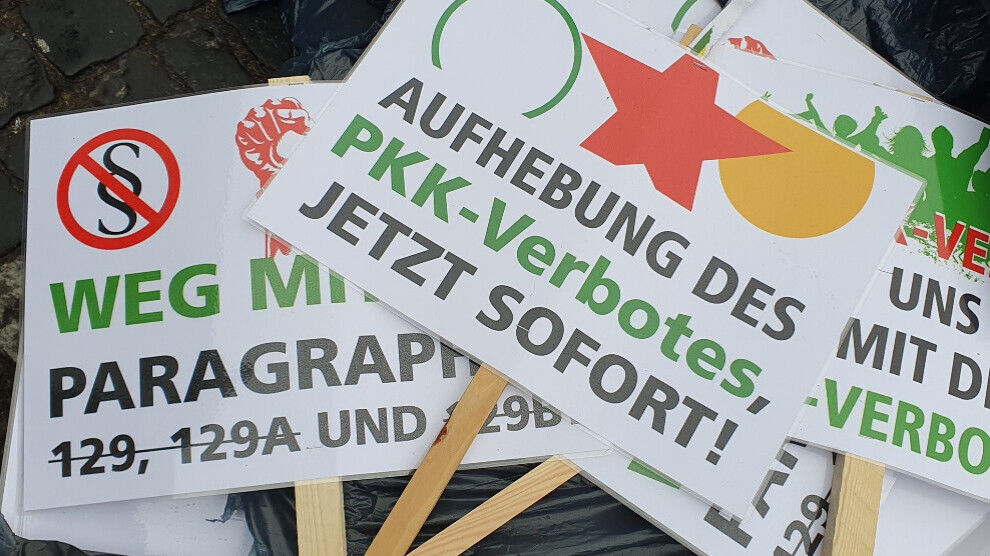The Association of Democratic Lawyers demands the lifting of the ban on the PKK's activities that was issued in Germany thirty years ago, saying: "The criminalisation of the Kurdish opposition must come to an end."

ANF
NEWS DESK
Saturday, 4 Nov 2023
Thirty years ago, the then Federal Minister of the Interior, Manfred Kanther, banned the Kurdistan Workers' Party (PKK) from operating in Germany. This year, the "Lift the PKK ban" campaign has launched a series of lectures to draw attention to the democratic deficit of the PKK ban in Germany and to create a deeper awareness of the goals of the Kurdistan Workers' Party in society, which revolve around gender liberation, social ecology and grassroots democracy. There will also be a nationwide demonstration against the PKK ban in Berlin on 18 November. The whole of November has been declared a month of action against the PKK ban.
The Association of Democratic Lawyers (Vereinigung Demokratischer Juristinnen und Juristen, VDJ) issued the following statement supporting this demand:
“On 22 November 1993, the then German Minister of the Interior imposed a ban on the PKK's activities. This was followed by bans on numerous organisations and media that were accused of being part of the PKK structure. The PKK has been listed as a terrorist organisation by the EU since 2002. Since then, hundreds of Kurdish activists have been charged with violating these bans and with violating Sections 129a and 129b of the German Criminal Code, and some have been sentenced to long prison terms. The more far-reaching attempt to criminalise gatherings of Kurdish organisations in general has so far failed in the courts.
As early as 1993, the Federal Ministry of the Interior justified the repressive measures as follows: "The activities of the 'Kurdistan Workers' Party' (PKK), including its sub-organisations 'Kurdistan National Liberation Front' (ERNK), [...] violate criminal laws, are directed against the idea of international understanding, endanger internal security, public order and other significant interests of the Federal Republic of Germany."
Even at the time, there were considerable doubts as to whether the ban actually served German security interests or rather the political interests of the Turkish government. Although Abdullah Öcalan had already declared his renunciation of violence in 1995, nothing was done in Germany to pave the way back to legality.
In the meantime, even the Office for the Protection of the Constitution had to make the following qualifying statement in its 2022 report: "Although peaceful events and activities continue to take centre stage in Europe, violence remains a strategic option for the PKK ideology."
Instead of proven violence, violence has become a vague strategic option, a legally intangible presumption. There have therefore been repeated attempts to end the criminalisation of the PKK by legal and parliamentary means, and rightly so. A motion tabled by the parliamentary group of Die Linke in December 2014 demanded:
Initiation of political steps to lift the ban on activities under association law for the PKK and its affiliated organisations as well as associations and media close to it, ending all sanctions under immigration law, amnesty, revocation of criminal prosecution as a foreign terrorist organisation, initiative at EU level to remove the PKK from the terror list, continuation of peace talks between the Turkish government and the PKK.
The PKK has repeatedly taken legal action against inclusion in the EU list of terrorist organisations. The ECJ only ruled in its favour because the EU's decision was formally flawed. In May 2022, the PKK once again applied to the Federal Ministry of the Interior to have its ban on activities lifted A decision is still pending.
The VDJ supports this application as well as other initiatives to end the criminalisation of the PKK, and the demands made by the Left Party parliamentary group in the Bundestag in 2014 are still valid:
1. to take political steps to lift the ban imposed in 1993 on the PKK and its sub-, subsidiary and successor organisations as well as its affiliated associations and media,
2. to revoke the authorisation of the Federal Ministry of Justice to prosecute the PKK as a foreign terrorist organisation under Section 129b of the German Criminal Code,
3. to end all sanctions in connection with the ban on the activities of the PKK and its sub-, subsidiary and successor organisations as well as its affiliated associations and media, the classification of the PKK as a foreign terrorist organisation pursuant to Section 129b of the German Criminal Code and its listing on the EU terror list,
4. to initiate political steps for an amnesty for all those who have only been convicted of membership or support of the PKK or its sub-, subsidiary and successor organisations or its affiliated associations and media on the basis of the ban on PKK activities under association law, or who are currently under investigation,
5. to campaign at EU level for the removal of the PKK (including organisations listed as a.k.a. such as KADEK, Kongra-Gel) from the list of terrorist organisations and to veto any further listing of the PKK at the next vote on the list at the Council of the European Union,
6. to encourage the Turkish government and the PKK to continue the peace talks that have begun in a constructive and transparent manner with the aim of securing lasting peace through the implementation of democratic reforms in the area of human and minority rights,
The VDJ calls on the Federal Government to respond to the motion of May 2022 and to implement the demands of the Left Party from 2014. The criminalisation of the Kurdish opposition must come to an end.”

No comments:
Post a Comment